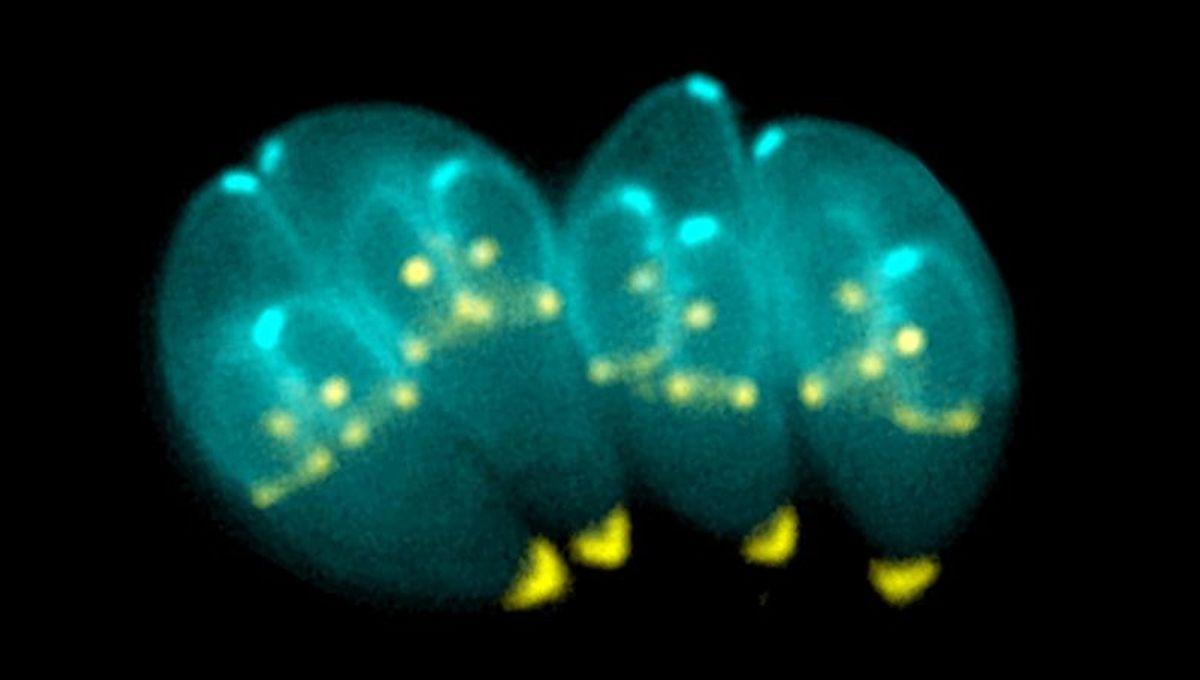Common Brain Parasite Infecting Up To 30 Percent Of Americans Disrupts Neuron Communication

Common Brain Parasite Infecting Up To 30 Percent Of Americans Disrupts Neuron Communication
New research explains how a common brain parasite, called Toxoplasma gondii, can disrupt brain functions, even when it only infects a small number of neurons. The microscopic parasite, which infects nearly one-third of the world’s population, interferes with communication between brain cells. The researchers behind the new study hope their findings will lead to new ways to detect and treat the chronic brain infection.
Toxoplasma gondii is an opportunistic bugger, capable of infecting pretty much any warm-blooded animal and has a particular preference for living in brain cells. Once someone or something is infected, the parasites form cysts in neurons that can last for life. Many people who are infected by the parasites (around 10 to 30 percent of the US) often don’t even know it. The parasite is often contracted from undercooked meat or exposure to cat feces. In many cases, infected people are asymptomatic, but some people do develop flu-like symptoms like fever, muscle aches, headaches, and fatigue. They may also have swollen lymph nodes, particularly in the neck. None of these symptoms are peculiar to the parasite and are common to other infections. Individuals with weakened immune systems, however, can experience more severe symptoms, including confusion, blurred vision, slurred speech, and are unsteady on their feet. It has even been claimed that getting the parasite can do wonders for your dating life, at least according to one study from 2022. In most cases, a person’s immune system will keep the parasite in check, but it can stay dormant in their brains for decades. At present, diagnostic tools can only detect whether a person has been exposed to Toxoplasma gondii by identifying antibodies. This, unfortunately, does not tell doctors whether the parasite is still present in the brain or how and to what extent it has impacted their brain function. But that may soon change. In their new study, researchers at the University of California, Riverside, found that infected neurons release fewer extracellular vesicles (EVs), tiny packets surrounded by a membrane that are used by cells to exchange information. “We found this disruption in EV signaling can interfere with how neurons and glial cells, especially astrocytes, maintain a healthy brain environment,” Emma H. Wilson, a professor of biomedical sciences in the Riverside School of Medicine, who led the research, explained in a statement. “Even a handful of infected neurons can shift the brain’s neurochemical balance. This suggests that communication between neurons and supporting glial cells is not only critical, but also vulnerable to hijacking by parasites.” The new findings could represent a new way to use EVs as biomarkers that can be isolated in a person’s blood. The existing research has focused on mouse models and human cells in a laboratory setting. In essence, in healthy mouse brains, astrocytes – a type of glial cell that makes up the majority of cells in the central nervous system – regulate neurotransmitters like glutamate. This ensures that neurons do not become overexcited (where a neuron fires signals too rapidly, not that it is looking forward to something). But when infected with Toxoplasma gondii, the neurons stop sending the right EV signals, resulting in regulation stopping and higher levels of glutamate, which can lead to seizures, neural damage, or altered brain connectivity. “The parasite may play a larger role in neurological and behavioral conditions than we previously thought,” Wilson added. Wilson and colleagues are now looking to analyze human blood samples for EVs linked to the parasite infection. They also hope to better understand how glial cells detect and respond to the parasite proteins, potentially offering new therapies or even vaccines in the future. “Our brains have built-in defenses that may recognize and respond to neurons infected by Toxoplasma gondii,” Wilson explained. “If we can learn how to support or enhance that process, we may be able to better protect people, especially the most vulnerable.” Despite its impacts, Toxoplasma gondii is often misunderstood. “There’s no need to avoid someone who is infected; most people live their entire lives without symptoms,” Wilson said. “Pregnant individuals should be cautious as the parasite can cause serious birth defects if contracted for the first time during pregnancy. The most effective prevention is proper food handling and hygiene. Cook meat thoroughly, wash vegetables, and always wash your hands after handling cat litter, especially from young cats, which are more likely to shed the parasite.” The paper is published in PLOS Pathogens.


